In The News: Editorial

Facing My Kenya
The chicken ran for her life. The lady pursued, machete high in the air. Weaving through the maize of Mfangano Island, the chicken tired and stopped. She would be served in my honor as the first white man, apala mukwongo, to visit. That was 1981.
We had come to Kenya, four whites and three blacks, tasked by Operation Crossroads Africa to staff the health center on Rusinga Island, Lake Victoria. The island was home to Louis Leakey's Proconsul africanus, the first erect walking primate, and Tom Mboya, a Luo who many believed would lead Kenya.
Operation Crossroads Africa aimed to introduce African Americans to white Americans and Americans to Africans. It succeeded. At orientation at Princeton University, William, a young black American, sneered as he promised that in Kenya I would discover hate. As an Israeli boy who had stuffed sandbags to cover his windows, I thought I had already discovered hate. On the island, William vilified our southerner, who slept in a hammock, as the plantation master. As William promised, he delivered.
The locals did not care about my color. We went out at night and came home with dozens of Nile perch. We ordered fried dough -- adwaro mandasi moro -- at the only tin shed that sold it. We walked two hours to Mbita to buy onions. We visited homes, where one man offered me his sister. They served fish paste, and I did my best not to make faces.
It was an innocent summer. On Rusinga, by a kerosene lantern I delivered a baby. I watched hippos bathe and avoided black mambas. We heard by transistor that Charles and Diana were married. We laughed and sang songs about malaria.
I returned with a traveling companion called Ascaris, which passed easily through Customs and me. I had diagnosed cholera, treated tetanus and taught nutrition. As a reminder, on my wall hangs a handmade spear that an old man gave me. I may be a highly technological Western surgeon, but inside me beats the heart of a mzei, a medicine man.
A friend asked me what has been my defining moment. The summer on Rusinga Island was not it. The summer on Rusinga Island was a mirror. It made me look back.
I came to America from Israel with the sound of artillery fresh in my ears. In Israel, where I was happy, we had had black guests from Ethiopia. We valued them because, unlike our neighbors, they talked with us, and race was not important. Not so in Africa, where race was an issue -- made by Americans, not Africans.
In Facing Mt. Kenya, the Kikuyu leader Jomo Kenyatta wrote: "The key to this culture is the tribal system." As a prime suspect in the assassination of Tom Mboya, he knew what he said. I thought of Mboya and Kenyatta when I read recently that in Eldoret, not far from Rusinga, Luo tribesmen burned 50 Kikuyu to death in a church. The country that so beatifically smiled at my young and adventurous heart is at war with itself.
The Cleisthenian polis of Athens, a city-state, rose on the ashes of kinship-based tribes. Under its thin veneer of transtribal allegiance are homicidal, genocidal, imperial tribes. Look at Iraq and Rwanda. Think about Russia and China and us. Understand that city-states are most cohesive when externally threatened. I wonder: Could we survive as we are when at peace?
Kenya was my mirror. It is again.


